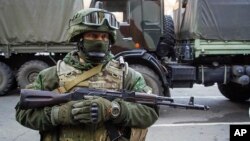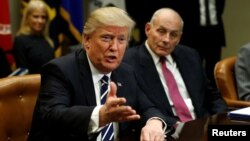Navigation
Install the app
How to install the app on iOS
Follow along with the video below to see how to install our site as a web app on your home screen.
Note: This feature may not be available in some browsers.
More options
You are using an out of date browser. It may not display this or other websites correctly.
You should upgrade or use an alternative browser.
You should upgrade or use an alternative browser.
Syria
- Thread starter Nienna
- Start date
The ClayTaurus
Senior Member
- Sep 19, 2005
- 7,062
- 333
- 48
Do you mean Syriana, the one with Clooney in it?
waltky
Wise ol' monkey
Kinda late, don't ya think?...

US Supplies First Armored Vehicles to Syrian Fighters
February 01, 2017 — The United States has provided Syrian fighters battling the Islamic State group with armored vehicles for the first time, a spokesman for U.S. Central Command told VOA.
Mebbe the Donald gonna trade Ukraine fer more influence in Syrian fight?...
US Flirts With Softer Stance on Russia's Conduct in Ukraine
February 01, 2017 | WASHINGTON — The Trump administration on Wednesday maintained a low-key approach to the latest flare-up of violence in eastern Ukraine, where the government accuses Russian-backed forces of stepping up attacks. The restrained tone may reflect the start of a new U.S. approach to dealing with Russia's cross-border activity, even as top U.S. officials are pledging to support Ukraine's sovereignty.
See also:
Sources: Trump to Focus US Counter-extremism Program Solely on Islam
February 01, 2017 — The Trump administration wants to revamp and rename a U.S. government program designed to counter all violent ideologies so that it focuses solely on Islamist extremism, five people briefed on the matter told Reuters.
US Supplies First Armored Vehicles to Syrian Fighters
February 01, 2017 — The United States has provided Syrian fighters battling the Islamic State group with armored vehicles for the first time, a spokesman for U.S. Central Command told VOA.
Guardian armored security vehicles were delivered to the Syrian Arab Coalition, Major Michael Meyers said. The SAC is an Arab fighting force within the multi-ethnic, but predominantly Kurdish, Syrian Democratic Forces (SDF). A U.S. military spokesman, Colonel John Dorrian, said via teleconference from Baghdad Wednesday that the Guardians - fully armored, highly maneuverable and capable of carrying 10 soldiers each - will help SAC forces better “withstand explosive devices and small-arms fire." “The Syrian Arab Coalition is getting ready to continue their operations to isolate Raqqa," Dorrian said. "As they approach the city and get into tough fighting, this capability is going to increase their survivability."

A Syrian Democratic Forces (SDF) fighter inspects a U.S.-provided Guardian armored vehicle delivered to the SDF in Syria
A VOA reporter in Kobani confirmed the vehicles, also known as M117s, were delivered on Tuesday. Each Guardian is equipped with machine guns and a grenade launcher. Multiple U.S. defense officials said the delivery had “been in the works for months” and was carried out under authority granted during the Obama administration. “There is no change to current policy by providing support to the Syrian Arab coalition,” Meyer said.
Washington has supplied the SDF with light weapons and special-forces advisers in the past and has provided air support against Islamic State fighters. An estimated 20,000 SDF fighters are connected to the Kurdish People's Protection Units (YPG), which Turkey considers a terrorist group. Even though the U.S. insists it only delivers military aid to the Arab fighters of the SDF, the assistance nonetheless has angered U.S. ally Turkey. “Recognizing terror organizations as interlocutors and delivering arms to them through various ways will help terror gain strength and spread it,” the Turkish National Security Council said in a statement issued after a meeting Wednesday chaired by President Recep Tayyip Erdogan.
US Supplies First Armored Vehicles to Syrian Fighters
Mebbe the Donald gonna trade Ukraine fer more influence in Syrian fight?...
US Flirts With Softer Stance on Russia's Conduct in Ukraine
February 01, 2017 | WASHINGTON — The Trump administration on Wednesday maintained a low-key approach to the latest flare-up of violence in eastern Ukraine, where the government accuses Russian-backed forces of stepping up attacks. The restrained tone may reflect the start of a new U.S. approach to dealing with Russia's cross-border activity, even as top U.S. officials are pledging to support Ukraine's sovereignty.
White House spokesman Sean Spicer had little to say on Wednesday when asked for the administration's position on the renewed fighting that began over the weekend and persisted into early Wednesday. At least 10 people have been killed and dozens wounded. President Donald Trump has been “kept aware of developments” in Ukraine, Spicer said, and the White House will “have further updates as we go on.” It was not immediately clear when those updates would come. The new rhetoric comes amid significant concern in Europe about Trump's overtures to Russia. The new president has called NATO “obsolete” and challenged America's allies to take on greater responsibility for defending themselves, while raising the possibility of a new era of U.S.-Russian cooperation.

A pro-Russia rebel stands guard during preparations for a prisoner exchange in Donetsk, eastern Ukraine
On Tuesday, the State Department responded to the violence in Ukraine but omitted any mention of Russia in a six-sentence statement that called for an immediate cease-fire and full implementation of the agreements meant to outline a political resolution to the crisis. Trump's U.N. ambassador, Nikki Haley, met with her Ukrainian counterpart “to reaffirm the United States' support for the sovereignty and territorial integrity of Ukraine,” according to a statement. The omission of Russia from the responses contrasted sharply with statements by the Obama administration, which sharply criticized Moscow for supporting and even directing attacks by the separatists, and not fulfilling its obligations under the 2015 truce plan signed in Minsk, Belarus.
The State Department statement reaffirmed U.S. backing for the Minsk plan, but that reference only came about after internal interagency discussions in Washington. According to an American official with knowledge of the discussions, White House officials questioned why the Minsk agreements needed to be mentioned at all even though the U.S. has insisted for almost two years on the deal's full implementation. The official wasn't authorized to speak publicly on the matter and demanded anonymity.
Change in tone
See also:
Sources: Trump to Focus US Counter-extremism Program Solely on Islam
February 01, 2017 — The Trump administration wants to revamp and rename a U.S. government program designed to counter all violent ideologies so that it focuses solely on Islamist extremism, five people briefed on the matter told Reuters.
The program, "Countering Violent Extremism," or CVE, would be changed to "Countering Islamic Extremism" or "Countering Radical Islamic Extremism," the sources said, and would no longer target groups such as white supremacists who have also carried out bombings and shootings in the United States. Such a change would reflect Trump's election campaign rhetoric and criticism of former President Barack Obama for being weak in the fight against Islamic State and for refusing to use the phrase "radical Islam" in describing it. Islamic State has claimed responsibility for attacks on civilians in several countries.
Aims to deter
The CVE program aims to deter groups or potential lone attackers through community partnerships and educational programs or counter-messaging campaigns in cooperation with companies such as Google and Facebook. Some proponents of the program fear that rebranding it could make it more difficult for the government to work with Muslims already hesitant to trust the new administration, particularly after Trump issued an executive order last Friday temporarily blocking travel to the United States from seven predominantly Muslim countries.

Homeland Security Secretary John Kelly, right, listens to U.S. President Donald Trump during a meeting with cybersecurity experts in the Roosevelt Room of the White House in Washington
Still, the CVE program, which focuses on U.S. residents and is separate from a military effort to fight extremism online, has been criticized even by some supporters as ineffective. A source who has worked closely with the Department of Homeland Security (DHS) on the program said Trump transition team members first met with a CVE task force in December and floated the idea of changing the name and focus.
In a meeting last Thursday attended by senior staff for DHS Secretary John Kelly, government employees were asked to defend why they chose certain community organizations as recipients of CVE program grants, said the source, who requested anonymity because of the sensitive nature of the discussions.
Money under review
Last edited:
Similar threads
- Replies
- 67
- Views
- 782
Latest Discussions
- Replies
- 101
- Views
- 590
- Replies
- 2
- Views
- 60
- Replies
- 4
- Views
- 9
Forum List
-
-
-
-
-
Political Satire 9269
-
-
-
-
-
-
-
-
-
-
-
-
-
-
-
-
-
-
-
ObamaCare 781
-
-
-
-
-
-
-
-
-
-
-
Member Usernotes 497
-
-
-
-
-
-
-
-
-
-